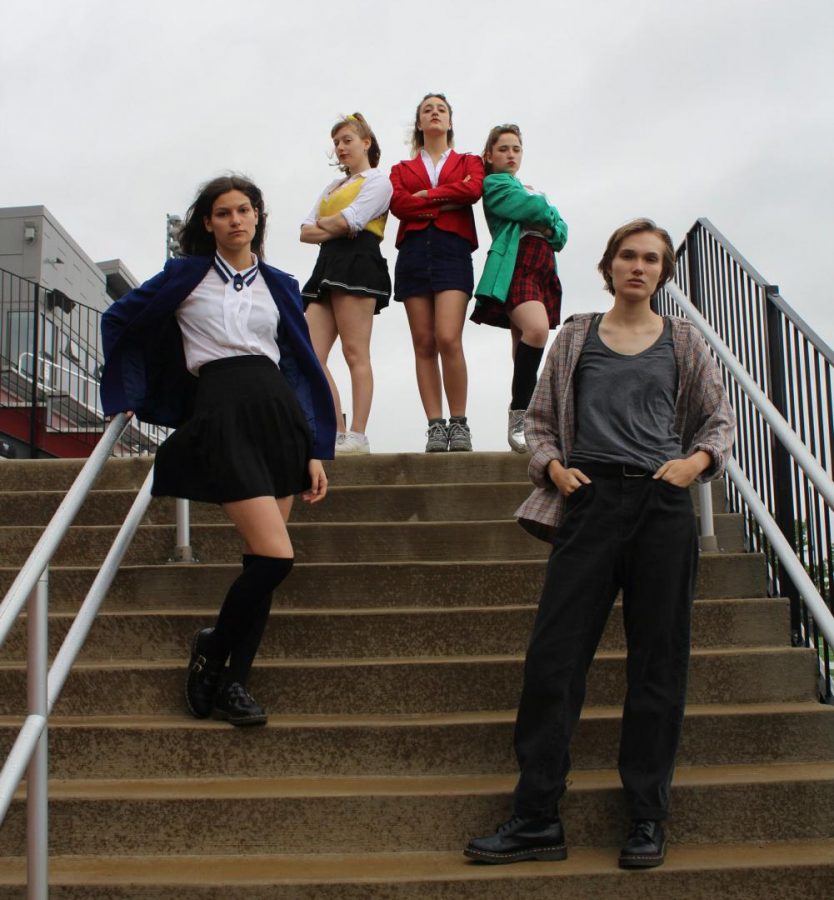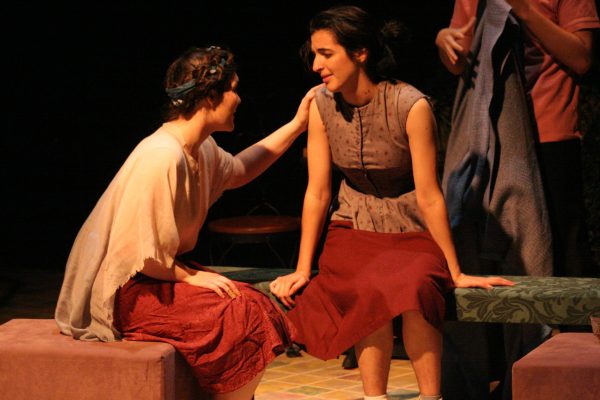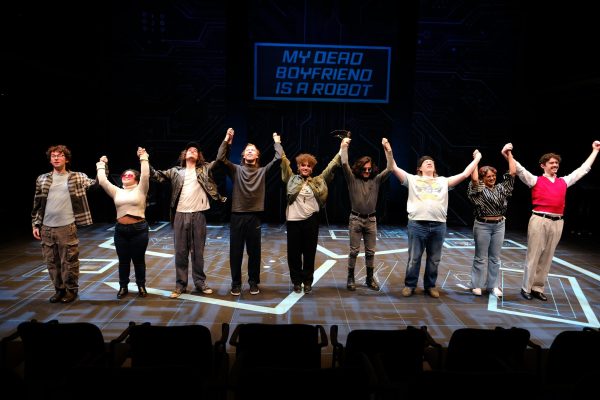“Heathers” Explores Dark Elements of High School
Photo by Kellianne Doyle, Staff Photographer
Cast members from Heathers: The Musical performed the cult ’80s hit dealing with issues of teen suicide, murder, and clique culture in Wilder Main Space Nov. 17.
Editor’s note: This articles contains spoilers for Heathers: The Musical, as well as mention of murder, suicide, homophobia, sexual assault, and intimate partner violence.
Heathers: The Musical, the darkly funny teen musical awash with ’80s references and pithy one-liners, opened Nov. 17 in Wilder Main Space and ran throughout the weekend. Though ostensibly a comedy, the musical — based on the 1988 movie of the same name — deals with a array of serious themes including suicide and murder. Set in a small-town high school, the main character, Veronica Sawyer — played by College junior Gabi Shiner — careens through a wide variety of situations and emotions. Plot points range from Veronica’s desire to join the clique of popular girls — all named Heather — to her involement in a toxic and eventually deadly relationship with J.D. (College junior Kirsten Mojziszek), a fellow high schooler with a fraught background.
“It’s teenage angst taken to the extreme,” said first-year Lauren Elwood, a member of the ensemble.
As Veronica herself says in the musical, “My teenage bullshit now has a body count.”
The music, directed in this production by College junior Benjamin Balatbat, turns on a dime. The show is front-loaded with numbers like the high-octane, heavily choreographed “Candy Store,” where the Heathers, played by College sophomore Talia Roland-Kalb, College junior Heather Loschen, and College sophomore Casey Labbate, threaten to send Veronica back into her unpopular obscurity unless she wholeheartedly joins their plot to humiliate Veronica’s childhood friend Martha (Conservatory senior Alexandra Sophocleus). There are also songs like “Fight For Me,” where Veronica describes the fight that J.D. and a pair of jocks engage in at the cafeteria while a chorus of students sings “holy shit” and the altercation plays out in slow motion before the audience’s eyes.
“The musical is really campy, in a lot of ways,” said Mojziszek, who played J.D. “It’s funny. The music is amazing and hilarious in so many ways, but also so dark, and you feel awful for laughing. That was definitely something we tried to balance — the campiness versus the serious — because it’s so easy to do a production that just plays up the campy bit and doesn’t really address the fact that there’s some really serious stuff going on.”
One of the big changes that Mojziszek as well as College junior and Director Ryan Linskey made when rehearsing this production was choosing to play J.D., normally played by and as a man, as nonbinary.
“It was queering the story, which was really exciting,” Mojziszek said. “But it’s also something hard to work with, especially because J.D. is the villain in this situation. It is a pretty annoying and sick trope that you’re always going to portray the queer person as the villain. But something that was exciting about this that Ryan [Linskey] and I had talked about a lot, especially in the first couple of days after he had cast me, was talking about how this is great because you’re making Veronica queer as well. So you’re also queering the hero.”
For a show that deals with homophobia in many explicit and deliberately comedic ways — J.D. gets into the aforementioned fight with the jocks after being called a homophobic slur, and the second act begins with a song called “Dead Gay Son,” entirely played for laughs — queering both main characters resulted in the play’s emotional beats landing with more resonance than they would in a traditionally cast production.
“During ‘Dead Girl Walking,’ people cheered when they saw the Ace bandage [that Mojziszek was binding her chest with while playing J.D.],” Shiner said. “It was cool that that was a thing that was meaningful to some people when they saw it.”
The relationship between J.D. and Veronica quickly devolves from a pairing that might have been charming and nerdy — they share moments over 7/11 slushies and Baudelaire quotes — to one that is highly toxic. The Oberlin cast highlighted this dynamic with great intention during the production.
“The relationship between J.D. and Veronica is abusive,” Mojziszek said. “I think that sometimes that gets blown over when you’re listening to the story or seeing it. It’s something where it’s easy to say, ‘Oh, J.D.’s a bad dude, or a bad person,’ and ‘here’s these popular girls,’ and not really delve into some of the things that are happening more seriously.”
“I think it’s an archetypal relationship that is less discussed, which is an abusive teenage relationship that forms on being in love with someone else’s trauma and their own f—ed up-ness,” Shiner added. “I think it’s common — this relationship of two teenagers that are drawn to each other and drawn to each other’s feelings that they will only find solace in someone else who understands what it’s like to feel like the most traumatized and messed up person around them. I think that the arc of that relationship ends up being so much about, ‘Oh, I definitely can’t be with a person based on how toxic everything else in our life is.’”
Although the musical deals sensitively with many of the issues that it attempts to address, it also falls short in other places, particularly at dealing with the instances of sexual assault that take place in the show. Loschen, who played Heather Duke, noted that some songs veered into particularly egregious territory.
“It’s written and adapted by people who are discussing experiences that aren’t necessarily their own, and they left a lot to be desired,” Loschen said about the writers of both the movie and the musical. “Particularly in the musical, the song ‘Blue,’ which is a fun number — and I know this, the writer said this, that they wrote that song to make the sexual assailants seem fun. And they’ve come out with a statement saying that they regret having written that song, they wrote a new song. But as a survivor, having my character enter the stage talking about having been sexually assaulted and trying to tell her assailant to go away, and then singing a fun number and having people laughing in the audience and seeing all their faces, was horrifying.”
For Shiner, a great deal of the value of Heathers comes from the way that it represents high schoolers’ stories and experiences with nuance and respect.
“People really do go through things with consequences at that age,” Shiner said. “It’s OK for the stories that transpire when you’re in high school to be real experiences that inform you as a person. It’s OK to accept that, and not be embarrassed about that.”
To Loschen, one of the reasons that this story has had such an enduring appeal on film and on stage is some of the feminist overtones woven through the story.
“Because the movie Heathers is so engrained in cult culture, and it was so important back then to see these really powerful women — you didn’t really see a lot of that, you didn’t really get interactions between women who were good and bad — and seeing women have agency, even if that agency was used in horrible ways, was really paramount at the time,” Loschen said. “And getting to embody that helped me continue to build that legacy. It gave me a feeling of power, knowing that people were excited to see me and excited to see me kick some ass.”








